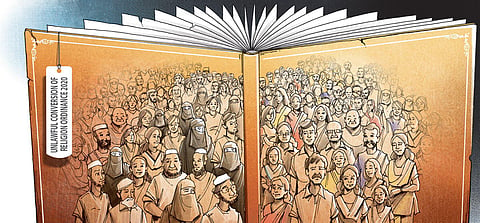

The Uttar Pradesh Prohibition of Unlawful Conversion of Religion Ordinance, 2020, came into force after Governor Anandiben Patel’s approval on November 27. Now ‘dishonest’ conversions by ‘force, coercion, enticement, deceit and fraud’, including for purposes of marriage, will be cognisable, non-bailable offences.
The penalties vary, from between one-year and five-year jail terms and fines of Rs 15,000 for adult conversions to a maximum imprisonment of up to 10 years and fines of Rs 50,000 if minors, Schedule Castes/Tribes or collective conversions are involved. Uttar Pradesh is the first state legally to target ‘love jihad’, but other BJP-ruled states, such as Haryana, Madhya Pradesh and Karnataka are reportedly expected to follow suit.
Does this mean one cannot change one’s religion in UP? No. That would violate fundamental rights as enshrined in our Constitution. Those who wish to convert can still do so by applying to the district magistrate two months in advance. Similarly, inter-religious marriages, without conversion, can still be solemnised quite easily under the provisions of the Special Marriages Act. The UP Ordinance is only aimed at quick conversions for the sake of marriage or some other dishonest reason.
The Ordinance nowhere mentions ‘love jihad’. Also, no religion is specified. That makes us wonder why its opponents are calling it ‘anti-Muslim’. The law would apply equally to a Muslim woman wishing to convert to Hinduism to marry a Hindu man or, which would be ever so rare, of a Muslim man wanting to become a Hindu to marry a Hindu woman. The fact that the Ordinance is being called anti-Muslim only shows that more Hindus, especially women, enter Islam than the other way round.
Unfortunately, the Ordinance, and the term ‘love jihad’ have become an inter-religious and inter-party issue. Once again, Hindutva is being blamed for going against the freedoms guaranteed in the Constitution and for trying to police the private lives and choices of individuals. Both objections are somewhat misplaced if we look at the context and history of inter-religious relations in the subcontinent and elsewhere.
The expansion of Islam was not only by conquest or voluntary conversion but by the incorporation of large numbers of female and child captives and slaves. In turn, the latter’s children automatically became Muslims. An ever-expanding Umma, or community of believers, being the professed mission of Islam, law and custom legitimated absorption of women from other faith traditions into Islamic society.
When conquered people were more respectably integrated, slavery and concubinage were upgraded to plural marriages with non-Muslim noble or upper-class women, as in the Mughal harem. Indeed, peaceable relations with inferior powers or vassals were often predicated on the marriage of the latter’s daughters into the Mughal royal family. Skip several centuries to the horrors of India’s Partition. The abduction of Hindu and Sikh women, with the inevitable retaliation from the other side, became part of the standard operating procedure of bloodthirsty communal mobs.
The horrible script of shame, dishonour, humiliation, mutilation and revenge was often carved on the bodies of women of both communities.In contemporary times, rampant sexual slavery, especially of Yazidis, in territories overrun by the Islamic State has been well-documented. Even in less unstable countries like neighbouring Pakistan, what we are witnessing today is systematic ethnic cleansing through the final stages of conversion and erasure of communities. The abduction, forcible conversion and marriage of Hindu and Christian girls by Muslim men is an almost daily occurrence.
The fact that our super-secularists ignore, either deliberately or through colossal ignorance, is the fundamental asymmetry between Abrahamic and Indic religions. The latter, in fact, are not even religions in the Abrahamic sense. They are not based on the special covenant of a chosen people with a singular and jealous God, but are essentially plural in both precept and practice. What this means in real-world terms is that there is no objection in Indic religions to desist from the worship of one deity or commence the worship of another.
In contrast, Abrahamic religions have mandated the worst punishments for apostasy, including torture or death in this world and eternal damnation afterwards. Even today, being an ex-Muslim, as we know in the case of world-famous heretics such as Taslima Nasreen or Ayaan Hirsi Ali, is fraught with great danger to life and limb.
It is in this historic context that we need to view the UP Ordinance. While any modern, democratic state must ensure freedom of choice of religion and of sexual partners, even orientation, to its citizens, it must also safeguard minors and other vulnerable sections of society from forcible or false inducements into fraudulent marriage or religious conversion.
It may be true that while the Ordinance reflects an anxiety in Hindu society, including the fear of demographic decline, some safeguards to its culture, traditions, religious practices and ways of life must also be granted to the majority community. After all, the founders of our nation and the makers of our Constitution did not intend to turn India into a minoritarian or anti-Hindu state.
While more statistics are needed, figures from Kerala show that from 2009-2012, as many as 33 times more marriageable women from other faiths converted to Islam than Muslim women to other faiths. Not just Hindus, but several Christian denominations in the state have expressed concern over this trend. ‘Love Jihad’, thus, is not easy to dismiss or demonise as a paranoid Hindu fantasy as some hard-line secularists have tried. Whether ordinances such as UP’s are the best way to tackle this is, of course, another question altogether.
Makarand R Paranjape(Tweets @MakrandParanspe)
Director, Indian Institute of Advanced Study, Shimla. Views are personal